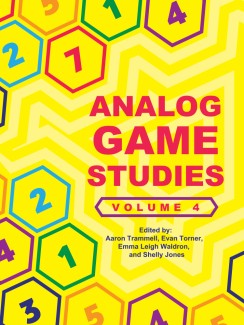Analog Game Studies
Analog Game Studies (Vol. 4)

Analog Game Studies is a quarterly journal for the research and critique of analog games. We define analog games broadly and include work on tabletop and live-action role-playing games, board games, card games, pervasive games, game-like performances, carnival games, experimental games, and more. Analog Game Studies was founded to reserve a space for scholarship on analog games in the wider field of game studies. Analog games are interesting in their accessibility, their innovative potential, and the already lively current discourse surrounding these games’ design and implementation. Anyone can design an analog game, as opposed to hardware-intensive video games, which often require massive programming teams with specialized skill-sets. Thanks to these games’ accessibility and agility, game studies scholars frequently use analog games to teach specific game principles, from the act of removing pieces in chess to building a character in Dungeons & Dragons. Yet serious studies of these games’ logics, affordances and constraints are scarce in the game studies community. We intend for the journal to help tease out broader socio-cultural meanings at stake in analog game design and play. Analog games ultimately permit designers to explore concepts and systems that would be otherwise impractical or hard to implement on a digital platform. Rather than conceiving of analog games as a “pure” game form, we recognize their specific histories, trajectories, and potential. We also recognize that much has already been said about analog game studies within design communities, and this forum will help us maintain a shared language across these mostly private networks and across disciplines such as history, psychology, media studies, sociology, anthropology and literary studies. Bridging these diverse networks is the purpose and reason for existence for this journal.
